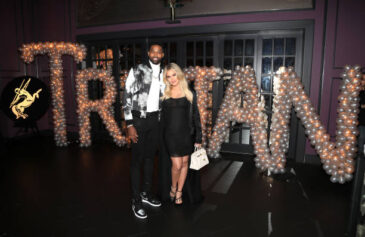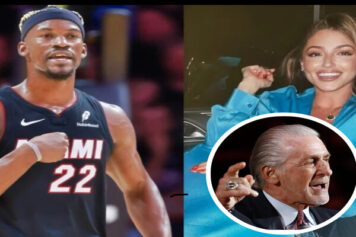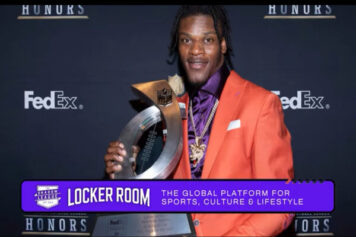The NBA’s first Black General Manager, Wayne Embry, National Civil Rights Museum President Terri Freeman, Founder of E Pluribus Unum and former Mayor of New Orleans Mitch Landrieu and NBA Champion, Miami Heat assistant coach and Vera Institute of Justice board member Caron Butler all gathered to discuss the state of our nation as it pertains to race and the importance of Dr. Martin Luther King.
With all of the pomp and circumstance, video clips, messages on shirts and a league-wide commitment to influencing social justice change and ending systemic racism, the NBA’s 30 teams currently include just nine Black general managers — Kolby Altman (Cleveland), Calvin Booth (Denver), Elton Brand (Sixers), Marc Eversley (Chicago), James Jones (Phoenix), Trajan Langdon (New Orleans), Scott Perry (Knicks), Troy Weaver, (Detroit) and Brian Wright (San Antonio).
READ MORE: Chicago Bulls Tap First Black GM, NBA Still Lagging On Minority Hiring
That’s just 30 percent, in a league that is roughly 80 percent Black. Something still ain’t adding up.
The saga continues when it comes to white owners’ unwillingness to hire Black people to positions of leadership within executive ranks. The needle hasn’t moved much since Embry became the NBA’s first Black GM and the first Black GM in major American professional sports, but incremental progress is being made.
READ MORE: Black Executives Are Making Power Moves In The NBA
Embry’s Trailblazing Terror
Having your life threatened by insecure racists because you were qualified to receive a job and are a person of color seems crazy. But this is the America that Embry experienced all too well when he broke the glass ceiling in 1972 with the Milwaukee Bucks.
When I first started out in 1972, I received many death threats,” Embry says. “I came to the game and the director of security asked me to come to his office. I went to his office and he pulled an envelope out with a letter in it and he said we received this. And I said yes, one more letter? I get 1-2 of those a month.
He said this is different and reached into a pocket and pulled a bullet out and said this is different – this was on your seat at the arena. And I said wow, okay and he said that they wanted me to go home we have an escort taking you to and from home and 24-hour surveillance on your house. And for the rest of that season, I had three FBI agents sit in my box with me. My wife was there at the game and was pretty hysterical and wanted us to quit. And I said no we’re not going to quit. You didn’t go to Selma and march with Dr. King for us to give up and quit.
Embry had already compiled a decorated NBA career as a player, with five All-Star appearances and a championship.
Having played alongside and even roomed with Oscar Robertson during their time with the Cincinnati Royals, Embry acted as a consigliere of sorts as the Bucks looked to push through a deal for the former MVP, in spite of his no-trade clause, to pair him alongside a young Kareem Abdul-Jabbar, then known as Lew Alcindor.
“After I was asked back here in the front office – Wes Pavalon said to me when he came to Boston to talk to me, ‘Oh by the way we’re negotiating a trade for Oscar Robertson, would you mind giving him a call and give him a little bit of encouragement since you’re coming back? What do you think of that?’ I said if you get Oscar Robertson it’ll be an instant championship. So I was kind of a prophet as well!
He said, ‘do you mind calling him,’ and I said, sure, ‘I’ll call him.’ I called Oscar and told him the great experience we had here in Milwaukee and that I think he deserves to win a championship and you hadn’t won anything until you won a championship and I said, by the way, I’m coming back to the front office and it’d be great. So we moved back here together.”
Perhaps influenced by Embry’s role in finalizing a deal that delivered the Bucks a championship in 1971, Pavalon promoted Embry in 1972, making him the first African American executive in the four major pro sports.
Embry made history with the Bucks and despite the racism, he executed masterfully in that capacity from (1972–1979). His career didn’t stop there He led the front office with the Cleveland Cavaliers (1986–1999), and Toronto Raptors (2006).
READ MORE: The NBA’s Dark Diversity Ceiling
His impact on the game was acknowledged when he was selected NBA Executive of the Year in 1992 and 1998. He won the race, but it was challenging to say the least.
Can you imagine having to live and exist and coach under those circumstances? We are talking about a basketball game and a Black man hired to run a basketball team. The racism was so deep, that many white people felt they were entitled to threaten a man’s life because he was a symbol of authority and influence within a basketball organization they rooted for.
The Wheels Of Justice Move Slow At The Top
Almost a half-century later and we are having the same conversations.
And as long as that’s the case, the culture of all-white ownership, leadership, and Commissioners will continue to create an oppressive working relationship, regardless of how individual player salaries balloon.
It’s deeper than rap.
I mean, NBA superstar Zion Williamson is balling for a city that has a Black GM (Trajan Langdon), yet still has confederate statues raised as a constant reminder of the history of racial oppression and evils perpetrated upon the Black residents of Louisiana. In the past, players have been rendered helpless to do anything about these offensive monuments, considered sources of pride for white oppressors.
When the George Floyd killing sparked an unavoidable movement, elevating race to the forefront of our national consciousness, white people in positions of power began to understand the plight of the African-American and admit that their silence has been as big a continual contributor to the survival of racism in this country as the white supremacist who calls for the hanging of little Black children. Or the racist business owner who refuses to hire Black or Brown people.
Former New Orleans Mayor Mitch Landrieu spoke about the process of removing confederate statues as mayor of New Orleans:
I’m embarrassed to tell you that I never thought about those monuments until my friend Wynton Marsalis and I were having coffee one morning. And he smacked me in the head and said if you want to do something and put your money where your mouth is, take those statues down.
He didn’t say it exactly like that, but that’s the way it felt. He said, ‘have you ever looked at them from our perspective?’ And I said, ‘no I hadn’t thought of them.’
And I got to thinking about it and found out they were in my purview on land the city-owned that I was in control of. We decided that it was time to make a statement that that is not who we wanted to be. And I just thought it was important as the city of New Orleans celebrated our 300th anniversary to get clean and to get right and to do what we could to fix the errors of our past, so we brought those things down. But I was very quick to say in a speech I gave that if all we do is take the monuments down, and we don’t change the attitude that helped put them up and keep them there – then we got a real problem.”
“We must listen to our African American brothers and sisters telling us what white privilege means. It doesn’t mean anything other than that your life has been made easier and our life has been made harder because we’ve decided to divide people based on the color of their skin and not the content of their character…
That’s why, whether you agree with their methods or not, when a player such as James Harden wants to leave because he’s had a conflict with the organization or he doesn’t want to be under the control of a specific white ownership group anymore, you have to understand that with less than 1 percent Black ownership (Michael Jordan) these kinds of flex’s that expose the systemic oppression, hypocrisy and blatant racial inequity of the league are applauded by most Black folks.
READ MORE: LeBron’s Black Power Play Is The Business Move That NBA Owners Feared
When Kyrie chooses to sit out some games at his discretion to reflect on social justice, spend time with family and work things out in his head, thus ignoring the rules and guidelines set in place to prevent players from taking days off whenever they choose, nobody Black (outside of Nets fans thirsty for a championship) is REALLY mad at him for that. It’s a flex that’s needed because Black players don’t usually become Black coaches or GMs. They certainly don’t become owners.
White ownership and the hiring culture of pro sports has made it so hard for Black candidates to move up the pipeline to leadership gigs, that leveraging power, and applying pressure to decide where they want to play is the only way players can get an inch of gain on those fronts.



